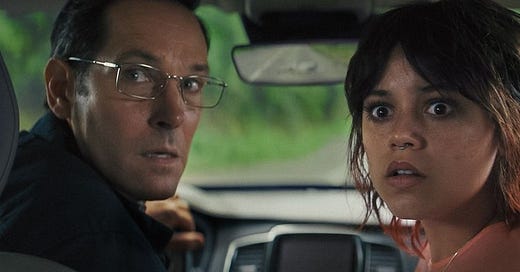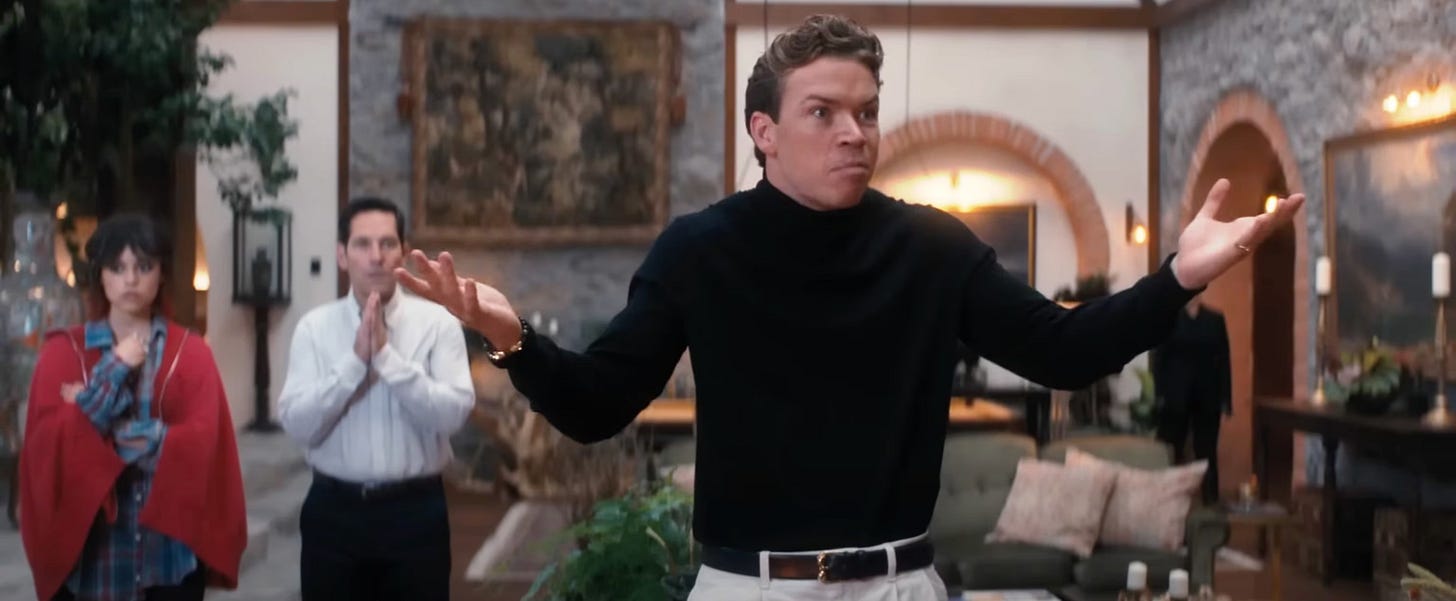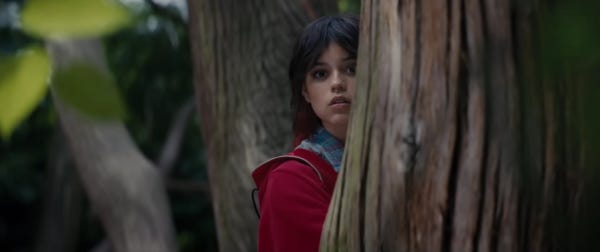If they were ever to start handing out awards for “Movie to ‘Genre’ the Hardest (and the Mostest),” Alex Scharfman’s first feature film Death of a Unicorn would easily take the cake. In what manages to be a creature feature mishmash of horror, comedy, satire, and, at times a (somewhat) effective portrait of a strained father-daughter relationship in the wake of a lost loved one, Death of a Unicorn succeeds to varying degrees within each genre. However, one element of the film that never wavers is Jenna Ortega’s performance as emotionally distant teen Ridley Kintner, who fully understands the kind of movie she’s in and delivers what turned out to be one of my favorite performances of her career. The majority of the other castmembers turn in solid performances as well, most notably Will Poulter as Shepard Leopold and Téa Leoni as Belinda Leopold - his mother - playing secondary fiddles to their dying rich oligarch of a father Odell Leopold (Richard E. Grant).
The film opens with Elliot Kintner (Paul Rudd) on a work trip to some kind of isolated estate in the Rockies. He’s seemingly dragged his daughter, Ridley, along with him as the two’s rocky relationship is revealed in the film’s opening scene when Ridley falls asleep on Elliot’s shoulder, only to wake up and immediately question why she’d do that. Elliot’s set to become a family attorney for the wealthy pharmaceutical company founder known as Odell Leopold, and - as revealed a few scenes later - they requested that he bring Ridley along with him with the hopes of learning more about him as a single father in the wake of his wife’s recent passing.
Scharfman’s command of the camera is strong in his first feature as he lingers on Ridley’s facial acne or focuses on Elliot’s seasonal allergies in the first act, all of which would seem confusing if it didn’t lead to some kind of payoff later. As Elliot and Ridley drive through the wilderness on their way to the estate, the two engage in a civil conversation that quickly turns awry when they bring up the recent death of Ridley’s mother. At the same time, Elliot receives a phone call from Odell looking to inquire about their ETA, and as his phone loses service, he also loses control of his speeding vehicle as it rams hood-first into some kind of creature crossing the road. Shellshocked by the incident, Elliot and Ridley both exit the vehicle and they slowly realize… they’ve just hit a unicorn.
It’s at this point where the film’s more surrealist features start taking center stage, and it became very clear to me that we definitely wouldn't be seeing this film on the big screen if A24’s Everything Everywhere All at Once wasn’t such a runaway success just three years prior. Matter of fact, A24 quite literally rolled out nearly the same playbook for Death of a Unicorn as they did for Everything Everywhere All at Once: both films had trailers released in early December, both premiered in early March at South by Southwest, and both fully released right at the start of Spring. However, while I very much liked some of what Death of a Unicorn had to offer, I don’t think we’ll be seeing this one at the 2026 Academy Awards.
Unsure about what to do with the dying unicorn lying in front of them on the road, Elliot takes a tire iron and whacks it a couple of times for good measure, purple unicorn blood splattering all over Elliot and Ridley as she watches in absolute horror at her father’s actions. The title screen pops up after a couple of Elliot’s whacks connect, letting the audience know what kind of ride they’re strapped in for. Elliot tosses the unicorn’s body in the trunk of their busted-up rental car and continues their trek to the Leopold Estate, opting to deal with the body after his meeting.
Hoping to secure financial stability and generational wealth for the Kintner family in the wake of his wife’s death, Elliot often foregoes conventional wisdom and thinking in his pursuit of money. He doesn’t listen to Ridley’s advice regarding the unicorn, opting instead to stay at the estate and push forward with the meeting. But when he tells Ridley to go wash her face in the bathroom, she quickly notices that with each scrub, a bit of her acne just… disappears. Moments later, Elliot realizes that his allergies haven’t been making him sneeze ever since they hit the unicorn. When the Leopold’s put two and two together, they mobilize every member of their family unit to harness the unicorn blood’s magical powers. However, it turns out the unicorn isn’t fully dead… and it’s got a couple of very, very, very angry family members out looking for it.
Death of a Unicorn is at its strongest when it leans all the way into its surrealist tendencies and creature feature horror spectacle, showcasing some truly gory kills in unexpected, innovative ways. Who knew a unicorn horn would prove to be such a fantastic murder weapon? It’s also apparent that the DNA of Jurassic Park and even Alien/Aliens are weaved into the foundation of this very film, with scientists and pharmaceutical heads looking to harness and exploit the unicorn’s restorative qualities to make a profit while helping only their close family friends. In addition to that, the movie also operates under the premise of only one unicorn existing, until they soon realize that there’s more than just one. And, I mean, Ridley… Ripley… c’mon. Y’all get it.
But that being said, nothing about the film wearing these two inspirations on its sleeve feels like a shortcoming. Instead, they’re typically some of the film’s strengths, along with the journey of discovery Ridley goes on as she dives headfirst into the lore of the unicorn, immediately researching mid-century portraits and paintings, hoping to find some connection to her modern-day problem. It’s in Ridley’s extensive and exhaustive search for the truth behind the unicorn and its supernatural healing abilities that the movie finds its footing as Ridley looks to correct the ever-growing series of hijinks happening within the Leopold Estate.
There’s definitely an attempt to make some kind of social commentary on the wealthy and how they’re willing to exploit any and everything in the name of personal profit and glory. Odell is inches away from holding what he believes is the key to immortality in his family’s name, and they waste no time sending the unicorn away for scientific experimentation. But, the social satire is a bit too broad and not nearly scathing enough to offer anything new to the recent onslaught of “social satire” films, with Knives Out, Triangle of Sadness, and The Menu all providing a much clearer lens into seeing just how awful the 1% are.
The film shines brightest when you’re fully engrossed in the moment-to-moment happenings at the estate, and performances like Jenna Ortega’s and Will Poulter’s most notably capture the film’s frenetic and focused energy the best. Poulter plays the stuck-up rich kid of the Leopold family to absolute perfection, providing just enough comedy and levity through his aloofness, resulting in him snorting lines of ground-up unicorn dust from its horn. The character banter between Ridley and Shepard offers up some of the film’s funniest moments, especially in the second half of the film as all hell breaks loose.
Paul Rudd is mostly reduced to the film’s straight man, playing just fine off the other characters’ muuuuuuuuuuuch bigger personalities, but I still can’t help but feel like he was fairly miscast in this role. I never quite bought the father-daughter relationship between Elliot and Ridley primarily due to Rudd’s performance; he still manages to give us all of the typical “Rudd-isms” you see in a typical Paul Rudd performance, but for more of the runtime than not, Rudd feels like he’s in a different movie than the rest of the cast, making the film’s emotional 3rd act turn a tough sell for me.
Death of a Unicorn was made on a modest budget of $15 million, and it feels like they gave the first half of the film about $2 million while reserving the rest of the money for the climactic and action-packed second half. The CGI starts shaky at best as the unicorn never fully looks like it’s real or even in the same space as the actors, making it incredibly obvious whenever Jenna Ortega is looking at a tennis ball instead of an animal. However, when the kills start gracing the screen, the difference in quality, care, and attention to detail in the VFX work is commendable more times than not. Death of a Unicorn reaches its highest heights when it forgets about the social satire it’s attempting and focuses solely on what it should’ve been from the jump: a slasher flick in the vein of Friday the 13th or Evil Dead featuring unicorns. While it doesn’t hit a perfect bullseye on every shot that it takes, each shot is definitely hitting the board, and I’m curious to see what feedback Scharfman incorporates into future works.
Rating: ★★★☆☆
Have you seen “Death of a Unicorn” yet? If you have, what did you think about it? And if you haven’t seen it yet, how come? Let me know your thoughts on Alex Scharfman’s first feature!






